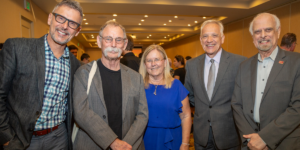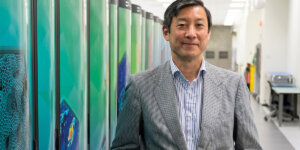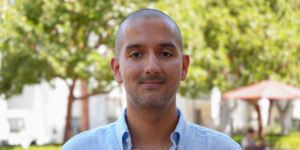
The NAE is seeking the ideas of engineers around the world to share their unique perspectives and ideas. (Photo/iStock)
On April 7, the National Academy of Engineering (NAE) issued a call to action to engineering students and professionals nationwide, requesting ideas for solutions to the current COVID-19 pandemic.
Through various means, the USC Viterbi School of Engineering has helped shape that call.
With its Call to Action, the NAE — the most prestigious engineering organization in the country — seeks to create a “virtual incubator of ideas,” where a diverse range of engineers can come together to brainstorm ways that engineering could be used to propose and provide solutions to problems that have arisen due to this pandemic.
“By bringing together resources, members of the community, and engineers in an online workspace, the NAE is creating an ecosystem for innovation with a focus on solving this immediate global challenge,” said Professor Andrea Armani, the Ray Irani Chair in Chemical Engineering and Materials Science and Professor of Chemical Engineering and Materials Science, Biomedical Engineering, Electrical Engineering-Electrophysics, and Chemistry – who serves on the executive committee for the NAE’s effort, as well as the evaluation panel that evaluates and provides feedback on ideas.
The idea for this call for action came from an original effort by the NAE’s Grand Challenges Scholars Program, or GCSP, to address the challenges posed by COVID-19. In its call for action, the NAE called for a larger inter-generational effort that includes both the GCSP students, as well as seasoned engineers and NAE members. Yortsos, who along Tom Katsouleas, the former dean of Duke University Pratt School of Engineering, and Richard Miller, president of the Franklin W. Olin College of Engineering, cofounded the GCSP, believes that the organization is uniquely qualified to address the challenges posed by COVID-19.
“Engineers are ideally suited to provide solutions to important problems,” said Yortsos, who has played a key role in developing and issuing this call to action and now serves on the NAE COVID-19 Call to Action board. “The mindset of the GCSP, which encompasses multidisciplinary, high-impact innovation with an emphasis on societal issues, is particularly relevant to this COVID-19 challenge.”
GCSP Scholar, Andrew Mang, a 2012 Duke graduate with a degree in mechanical engineering and economics, and Rachael Lau, a current Duke senior and GCSP scholar who is passionate about disaster response and using engineering to improve social well-being, were instrumental in getting this effort started. Mang went on to found Aswanet, a company that helps to provide sustainable access to safe water in East Africa.
“Because the mission of the GCSP program focuses on broad and interdisciplinary engineering solutions, I think it’s an organization with a network well-suited to get technical people to be able to define and solve multidisciplinary problems,” Mang said.
Mang’s idea of sending out a call to action to members of the GCSP network was developed further by Lau. Their ideas were immediately supported by Randy Atkins, the director of communications and media relations at the NAE, and by Yortsos, who, as a co-founder of the GCSP, reached out to the network asking for help and ideas.
“As engineers, we have a responsibility to think critically about how we can engineer for humanity – mobilizing a force of engineers who think like this is incredibly powerful,” Lau said.
The call to action was sent out to the GCSP community, which includes universities across the country, from Dartmouth College to Arizona State University, and across the globe to universities in Australia, China, Canada, India, Italy, and to members of the NAE and of the Frontiers of Engineering program. While NAE members are elected after a lifetime of major accomplishments, members of the Frontiers of Engineering, or the FOE, are engineers nominated by their peers for showing great promise and potential early on in their careers.
“This effort is a multigenerational initiative,” Atkins said. “We want the involvement of all three groups so we have these bright university students, these talented early-career engineers, and these established and respected engineering professionals all sharing their unique perspectives.”
NAE Accepting Ideas
The NAE is accepting ideas from these three groups as well as from engineering students and professionals around the world. The NAE also plans to eventually include the involvement of individuals from other fields, from social workers to economists to artists. Interested individuals can fill out a form, which categorizes volunteers into three categories: those who just want to help and be involved in the efforts any way they can; those who have a concept or idea for a technology that needs further development; and those who have a completed and tested technology that they seek to bring into effective action.
The call to action has already received several hundred responses, Yortsos said. Ideas could be related to everything from new technologies to more effective production of medical supplies to mechanisms to support mental health and well-being.
A team of Frontiers of Engineering alumni forms the Technical Screening Committee (TSC), which reviews and prioritizes these responses.
After the TSC screens and prioritizes ideas, the teams are trained by the I-Corps Innovation Node in Los Angeles, one of nine NSF Innovation Corps Nodes across the country. The accelerated training helps the further development of the ideas, which are then recommended to an Expert Review Committee for further evaluation and implementation.
A Crisis Offers Opportunities
GCSP’s mission of advocating for engineering solutions to address major challenges becomes even more important in a time of crisis, said USC Viterbi Professor Najm Meshkati, a GCSP faculty adviser.
Meshkati, a professor of civil and environmental engineering, industrial systems engineering, and international relations, sent out an email to all his current and former students urging them to participate in the NAE Call to Action in any way they could.
“I believe that this is a unique experience that will truly convert students into becoming global engineers,” Meshkati said. “I believe this effort will constitute a transformative experience for all participating students while hugely helping humanity.”
Lau agrees, believing that engineers and creative-thinkers have the ability to enact powerful, positive changes around the world by beginning in their own communities. “As a young engineer,” Lau said, “it’s remarkable to see how incredibly interconnected our global community is and how we can mobilize to affect changes in our local communities for global impact.”
The action call is not only looking for ideas that could address immediate problems and emergencies caused by COVID-19, but it also seeks innovative solutions to longer-term problems, looking into future needs for economic recovery and planning to better handle future pandemics.
“Dean Yortsos is mobilizing us to get involved in solutions that will prosper beyond this pandemic,” said Julia Sircar, a member of the GCSP program and a senior at USC Viterbi studying industrial engineering. Sircar is working alongside another USC Viterbi senior majoring in industrial engineering, Soraya Levy, and the two women are leading the charge in the initial review of proposals submitted to the incubator.
“A crisis offers the opportunity to innovate and re-invent,” said Yortsos in a recent message to the GCSP community. “The GCSP can help inspire students, across all universities, and all our constituencies to work together in our mission to engineer a better world for all humanity, a goal that is more urgent than ever before.”
Published on April 27th, 2020
Last updated on November 27th, 2024













